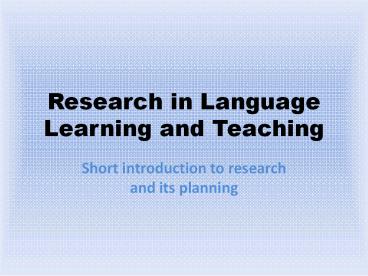Research in Language Learning and Teaching - PowerPoint PPT Presentation
1 / 15
Title:
Research in Language Learning and Teaching
Description:
Research in Language Learning and Teaching Short introduction to research and its planning What is research? A systematic process of inquiry consisting of three ... – PowerPoint PPT presentation
Number of Views:265
Avg rating:3.0/5.0
Title: Research in Language Learning and Teaching
1
Research in Language Learning and Teaching
- Short introduction to research and its planning
2
What is research?
- A systematic process of inquiry consisting of
three elements or components (1) a question,
problem or hypothesis, (2) data, and (3) analysis
and interpretation. - (Nunan 1992, 3)
3
Basic vs. applied research
- Basic research
- acquire knowledge for the sake of knowledge
- get more complete understanding of world.
- Applied research
- Deals with human and societal problems in the
hopes of finding solutions to real-world
problems. - Not trying to postulate theory but trying to find
answers for a specific time, place and context. - (McKay 2006, 4)
4
Fundamentals in research
Research should be able to meet the tests of
- Validity gt
- Reliability gt
- Success of measuring what was planned strength
of conclusion - Research is repeatable
and, according to Nunan, be published (publish
in the broad sense of to make public) (Nunan
2005, 225)
5
Research paradigms
- Paradigm is a set of basic beliefs
- Three dominant paradigms
- Positivsm
- Constructivism
- Critical Theory
- Paradigm wars of the 70s and 80s over
- More pragmatism reigns now but getting an
overview still daunting for new researchers
6
Fork in the road
- Although the days of crude alternatives in
research have passed and combinations are
possible, a choice in language learning research
normally has to be made for - Empirical research or
- description (of pedagogical practice)
(textual-hermeneutic studies)
7
Research What?
- Strictly speaking anything in language teaching.
- General areas
- Language policy
- Syllabus, curriculum
- Materials, textbooks, etc.
- Technology
- Methodology
- Specific skills
- Teaching of grammar, vocabulary, etc.
- Language for specific purposes
- Culture
- Motivation, affective factors
- Etc.
8
Overall Methodology
- Approach to research
- Quantitative research (e.g. cross-sectional
process-product) - Qualitative
- Ethnographic
- Action research
- Case study
- Etc.
- Mixed method research
- Etc.
9
How Methods (Tools?)
- Means of gathering data with certain procedures
- Observation (sound, video, note-taking, material
handed out) - Survey/Feedback
- questionnaire,
- interview (formal or informal)
- Conversation analysis
- Tests
- Verbal reports
- Learner diaries
- Ethnographic methods e.g. observation (multiple
sources of data) and participation by researcher - Case study
- Linguistic survey
- Corpus-based research
- Text-based research
- Etc.
10
Research Who?
- Researchers
- Teachers
- Learners (why not?)
- Being researched
- Learners (individuals, grades, groups age,
proficiency, etc.) - Teachers
- All teaching material
- Teaching situation
- Texts
- ---gt combinations possible or necessary
11
Research Steps of research
- Determine general research area/topic
- Do survey of literature, i.e. research the topic
- Formulate research question or hypothesis
- Determine aim of research
- Describe theoretical basis
- Determine research design
- Methodology
- Tools
- Collect data
- Describe process and results
- Discussion and Conclusion
12
Pilot study or prototype
- Useful before a large research project to test
feasibility of hypothesis, planned methods, use
of technology, etc. - It is much smaller study than eventual project.
13
Tip on collecting sources
- Any photocopy you make or any good statement you
write down, ALWAYS write the source down, i.e.
where you found it. - That means
- author,
- date of publication,
- title of book/journal article/website/, place of
publication and publisher (for book) OR title of
journal, edition and number, page(s) (for
journal) OR URL, date viewed (for website)
14
In closing
- As researcher be aware of
- your own assumptions on language learning and
teaching - the exact aim of research
- boundaries of research (or put differently what
you are NOT researching) - choosing appropriate methods for the research
- the fact that research of language teaching and
learning is about humans! Protect them and let
them benefit. (McKay 2006, viii)
15
Bibliography
- Hinkel, E. (ed.). 2005. Handbook of research in
second language teaching and learning. London
Routledge. Available on Google Books
http//books.google.co.za. (This book is highly
recommended.) - McKay, S. 2006. Researching second language
classrooms. London Routledge. Available on
Google Books. (This book is highly recommended.) - Nunan, D. 1992. Research methods in language
learning. Cambridge, UK Cambridge University
Press. - Nunan, D. 2005. Classroom Research. In E. Hinkel
(ed.). Handbook of research in second language
teaching and learning. London Routledge.
225-240. Available on Google Books. - Richards, K. 2009. Trends in qualitative research
in language teaching since 2000. Language
Teaching, 42(2) 147-180.

